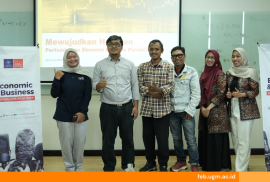The calculation of workers’ wage deductions for Tabungan Perumahan Rakyat (TAPERA) contributions is currently under scrutiny. The government has officially enacted Government Regulation (PP) No. 21 of 2024, amending PP No. 25 of 2020 on TAPERA since May 20, 2024. These contributions must be paid by employees, self-employed individuals, and employers every month.
Qisha Quarina, Ph.D., a researcher at the Microeconomics Dashboard (Micdash) of the Faculty of Economics and Business at Universitas Gadjah Mada (FEB UGM), emphasizes that the management of the TAPERA program must be transparent. The TAPERA policy can succeed if there is transparency and a sound mechanism.
“TAPERA policy can be successful if there is transparency and a good mechanism. Regular monitoring and evaluation are also necessary,” she explained on Monday (June 3) at FEB UGM.
Qisha explained that the success of TAPERA must be followed by regular program monitoring and evaluation, especially regarding the management of participant funds. This step is necessary to avoid mismanagement or misuse of funds and to encourage the better utilization of funds for low-income communities (MBR) to access decent housing.
So, is TAPERA the right solution? Qisha stated that the presence of TAPERA aims to collect and provide sustainable, long-term, low-cost funds for housing financing to meet the need for decent housing, especially for low-income communities. TAPERA participants consist of employees and self-employed individuals who earn at least the minimum wage, with a savings contribution rate of 3% of the reported monthly income.
However, the ratification of the TAPERA PP has caused much controversy and opposition, especially from employers and labor/worker associations directly affected by the regulations. Qisha mentioned that, on the one hand, TAPERA is intended as a mutual aid fund to help low-income workers with housing financing. However, this program aims to burden the contribution obligations of employers and workers.
“Meanwhile, the main root of the housing sector problem in Indonesia today is not just the high price of houses and the community’s low income. The housing sector issues in Indonesia are also related to houses that do not meet decent living standards and the housing backlog due to the imbalance between supply and demand,” she explained.
Furthermore, Qisha said the TAPERA program aims to provide access to decent housing for low-income communities. However, the TAPERA regulations do not specify the quota for how many people can benefit from TAPERA itself. There are several requirements that workers must meet to access funding for Home Ownership Credit (KPR), Home Construction Credit (KBR), and Home Renovation Credit (KRR). One of the primary keys to obtaining this access is for participants to be included in the annual quota of TAPERA beneficiaries. Meanwhile, low-income TAPERA participants who still need to get a quota must wait indefinitely. Therefore, the government must show transparency regarding the selection process of participants included in the annual quota and its ranking mechanism, which is an effort to increase public trust in the government, especially in the TAPERA program.
Qisha believes that the benefit scheme of the TAPERA program needs more transparency and tends to ignore middle-income workers. Middle-income communities and those who already own homes receive little attention. The regulations of PP No. 25 of 2020 state that non-MBR participants will receive their savings and the accrued interest at the end of their participation period. However, the government is deemed to pay insufficient attention to middle-income communities, considering this group often needs priority as they are deemed capable of meeting their own needs. With the obligation to pay monthly contributions of 2.5% or 3% for self-employed workers, middle-income communities could use these funds for other investments.
“The government should also pay attention to middle-income communities and provide alternative access to improving their economic well-being,” she emphasized.
Source: Micdash
Editor: Kurnia Ekaptiningrum
Photo: freepik.com
Sustainable Development Goals










